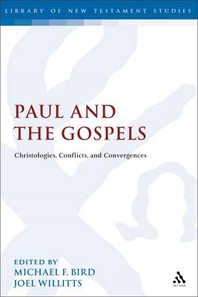 Before I get to my comments on Michael F. Bird’s article, I think it will be best to give my impression of his work in general so my remarks are not misconstrued. My first encounter with Dr. Bird’s work was in 2007, which was just about the time N.T. Wright’s influence in my thinking began to wane. I read Dr. Bird’s book on the righteousness of God and was very impressed by his research and judiciousness, even though I did not always agree with him. I then became a follower of the blog that he and Joel Willits (the author of the book’s next article) contribute to and so, one could say, he introduced me to the Biblioblogsphere. Overall, I have been very impressed by his ability to write well, his irenic attitude along with his sense of humor (especially at his speech he gave at IBR after N.T. Wright). So the things I have to say are comments on the article in question and not him or his work in general.
Before I get to my comments on Michael F. Bird’s article, I think it will be best to give my impression of his work in general so my remarks are not misconstrued. My first encounter with Dr. Bird’s work was in 2007, which was just about the time N.T. Wright’s influence in my thinking began to wane. I read Dr. Bird’s book on the righteousness of God and was very impressed by his research and judiciousness, even though I did not always agree with him. I then became a follower of the blog that he and Joel Willits (the author of the book’s next article) contribute to and so, one could say, he introduced me to the Biblioblogsphere. Overall, I have been very impressed by his ability to write well, his irenic attitude along with his sense of humor (especially at his speech he gave at IBR after N.T. Wright). So the things I have to say are comments on the article in question and not him or his work in general.
The first of the three theological areas that he forwards as being shared uniquely by Paul and Mark is that of their explication of the theology of the cross. Bird notes that the proclamation of the cross was an identity marker of Early Christianity, yet he still attempts to show Paul and Mark are similar. I must admit, I was skeptical of this argument from the beginning. As for a theology of the cross, it is true that this is, “conducive to Pauline proclamation,” but, the same can be said for other writers of the NT. I, for the life of me, cannot see a huge difference in this area between Mark and Matthew, except maybe, Matthew includes other themes in his gospel so it may leave the impression that this theme is not “central.” Personally, I doubt that potential impression.
Next he points out Triumphal imagery as being unique to Mark and Paul yet of the one verse he sighted from the Undisputed Letters appears to be wrong (2Cor 4:9 says, “persecuted, but not forsaken; struck down, but not destroyed”). Then he points out the “mystery” language coupled with the heavenly portents, darkness at noon and the torn temple veil all show that Mark shares and apocalyptical perspective with Paul, yet, his point becomes moot when it is pointed out that Matthew also has all of these apocalyptic imagers[1] (don’t forget the other resurrections in Matthew!).
Next he claims that, “only Mark and Paul portray Jesus’ crucifixion as a royal triumph (Mark 14―15; Rom 8:37; Col. 2:15). I looked up this claim regarding Romans 8: 37 in commentaries on Romans by Fitzmyer, Shreiner, Dunn, Jewett and Barrett and none of them stated that they saw this imagery in the text. The Colossians text definitely employs royal triumph in that “rulers and authorities” are triumphed over, but, one must admit that this imagery is unique to Paul in this letter which, of course, has has a major question of authenticity hanging over its head. As for Mark being the only Gospel that employs “royal triumph,” I am not sure how one could say that this theme is not present in Matthew.
The second area that he believes exhibits an unique similarity is that of the specific terminology that is employed when they speak of salvation. Particularly, he points to the use of απολυτρωσις (redeemed) as a similarity, yet, he then points out that Hebrews and Luke each use the term, or its cognate, twice! After that, he forwards as evidence precisely that which James Crossley disputed in the first article, i.e., that Mark was concerned with a Gentile mission in the same way Paul was. Overall, the argument gives the reader very little reason to believe that a clear and unique usage of salvation terminology exists between the two writers.
In the last area of supposed influence, that of the attitude to the Law, again he makes a distinction yet never shows the reader how the two entities are distinct from the rest of the NT. In order to find unique similarity with Paul on this theme he claims, against Crossley, that Mark 7:19, “certainly opens up of some persons eating foods that some others considered unclean.” But, when he considers Peter’s dream in Acts (i.e., the evidence that would disprove the unique similarity) he says, “the vision does not legitimate culinary licence, but shows that God is impartial.” I could not help but wonder why this distinction is made since this is not a conclusion that is apparent from the text. Remember, Bird’s point is that Mark’s editorial comment could lead to an understanding by some that eating taboo foods was now permitted but the text in Acts, where God tells Peter three times to “kill and eat” unclean animals could not just as easily lead to the same conclusion.
Now, I do agree with Bird, the pericope in Acts is not about food being clean but it is about Gentiles being clean, yet, food is a major part of the imagery in Peter’s revelation. Assuming Dr. Bird’s distinction between the meaning of the two texts is true it still seems to me that, against Dr. Bird, both texts can just as easily lead to the same misunderstanding.
Overall, I did not get the impression that the evidence led to Bird’s conclusion. By this, I do not mean that Mark and Paul do not share similarities; I only disbelieve they share unique similarities. If their similarities are not unique then Dr. Bird’s thesis is weakened substantially. Also, when one attempts to make an argument by sheer accumulation of “minor” evidence on must be sure that the evidence is clear which, in this case, I cannot agree that it is.
- [1] mystery in Mt. 13:11; darkness at noon Mt. 27:45; the torn curtain 27:51↩






 Before I get into my comments on Dr. Crossley’s article I must note that I have not read much of his work (I have only read two articles that he published). The reason for not having read much of his work is not that I am uninterested, but, I simply have not had the time to get to them since his dissertation on dating the Gospel of Mark is high on my “Reading List.” I attended a critique of his most recent book at the last SBL and found him to be quite entertaining and bright.
Before I get into my comments on Dr. Crossley’s article I must note that I have not read much of his work (I have only read two articles that he published). The reason for not having read much of his work is not that I am uninterested, but, I simply have not had the time to get to them since his dissertation on dating the Gospel of Mark is high on my “Reading List.” I attended a critique of his most recent book at the last SBL and found him to be quite entertaining and bright.